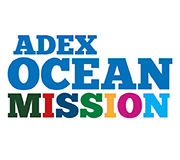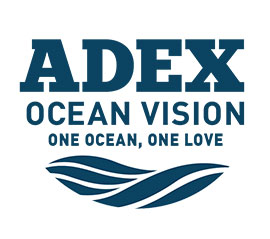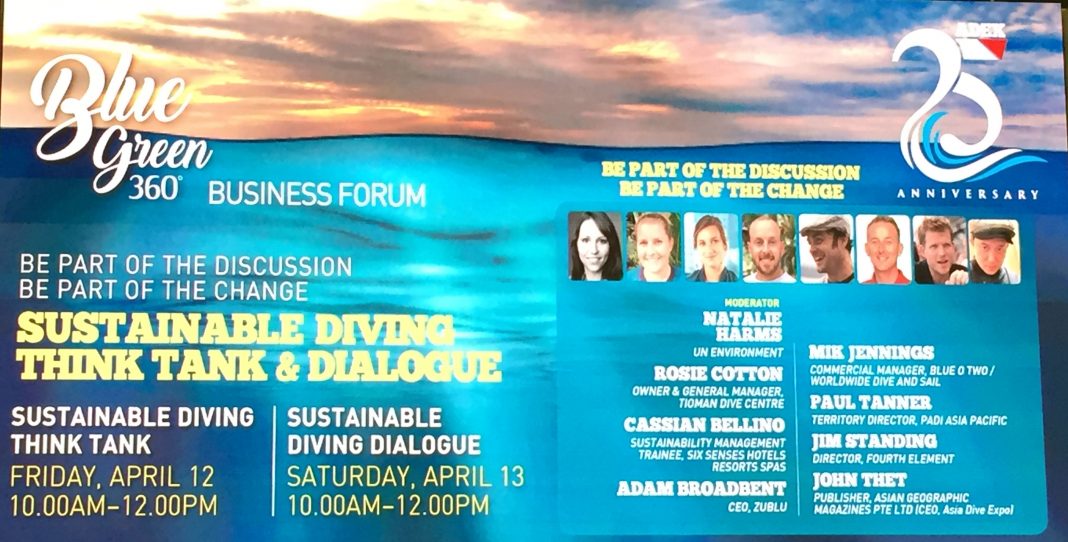The oceans regulate our climate, absorbs carbon dioxide and is the main source of protein for more than a billion people on Earth. Asia is home to incredible green bio-diversity but all across the entire Asia Pacific, there are lots of threats to marine life such as bomb fishing, plastic and waste pollution. With the growth of marine tourism and the increasing consumption of seafood all across the world, the fishing industry and marine tourism industry both depend heavily on healthy marine eco-systems.
Organized by Asian Geographic Magazines in cooperation with Reef World Foundation (Green Fins), the Sustainable Diving Dialogue is an unprecedented panel discussion moderated by Ms Natalie Harms from United Nations Environment that saw some of the most influential people in the global diving industry gathered together to discuss how to combat marine pollution and the current and future direction of sustainable marine tourism across the entire Asia Pacific region. Held on April 13 2019, 10 a.m at ADEX Singapore 2019, the panelists shared the problems and solutions they encountered from implementing sustainable solutions while valuable insights and help were offered by sustainable manufacturers to the other panelists in the forum.
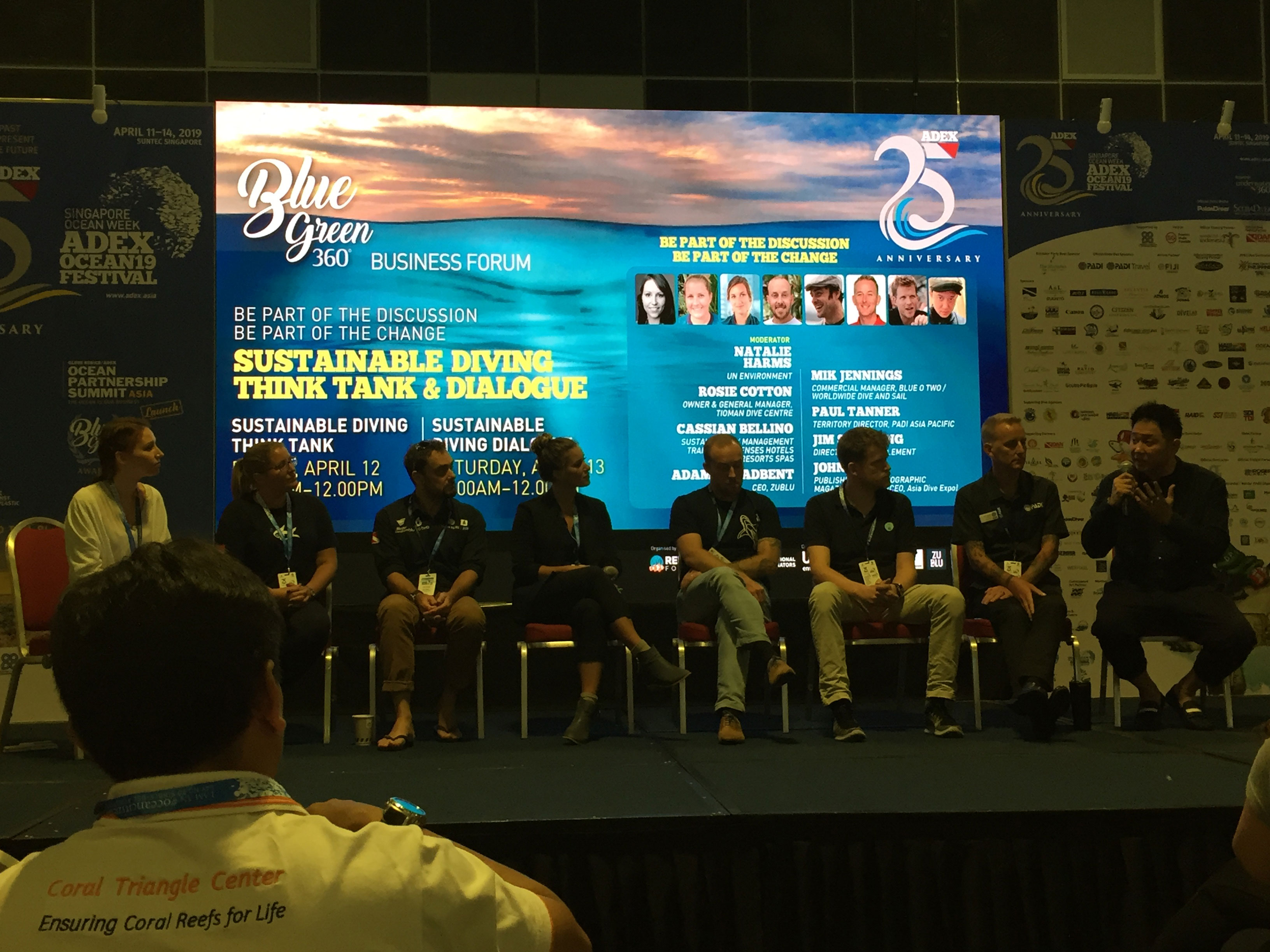
Co-moderated by Ms Chloe Harvey from the Reef World Foundation (Green Fins), the panel consisted of Ms Rosie Cotton (Owner and General Manager of Tioman Dive Centre), Mik Jennings (Commercial Manager of Blue O Two / Worldwide Dive and Sail), Cassian Bellino, (Sustainability Management Trainee from Six Senses Hotels Resorts Spas), Adam Broadbent (CEO of Zublu), Jim Standing (Director of Fourth Element), Paul Tanner (Territory Director, PADI Asia Pacific) and John Thet (Publisher of Asian Geographic Magazines).
The Challenges of Sustainability
According to Natalie, the UN is working with governments to improve ocean governance by starting regional marine programmes to reduce plastic pollution. One of the main challenges addressed in the discussion was the practical implementation of sustainable solutions.
Case Study: Tioman Dive Centre
Awarded the Green Fins Award for having the lowest environmental impact overall, the Tioman Dive Centre had put in place a series of small changes recommended by Green Fins that put them on their way towards sustainability. Rosie Cotton, owner and General Manager of Tioman Diver Centre, was grateful to Green Fins for the considered actions recommended to them which promoted change without disrupting her business. By transmitting the correct sustainability mindsets and behaviour to her staff, the Tioman Dive Centre staff were in turn able to pass on this wisdom to customers. Being consistent was key to effective change.
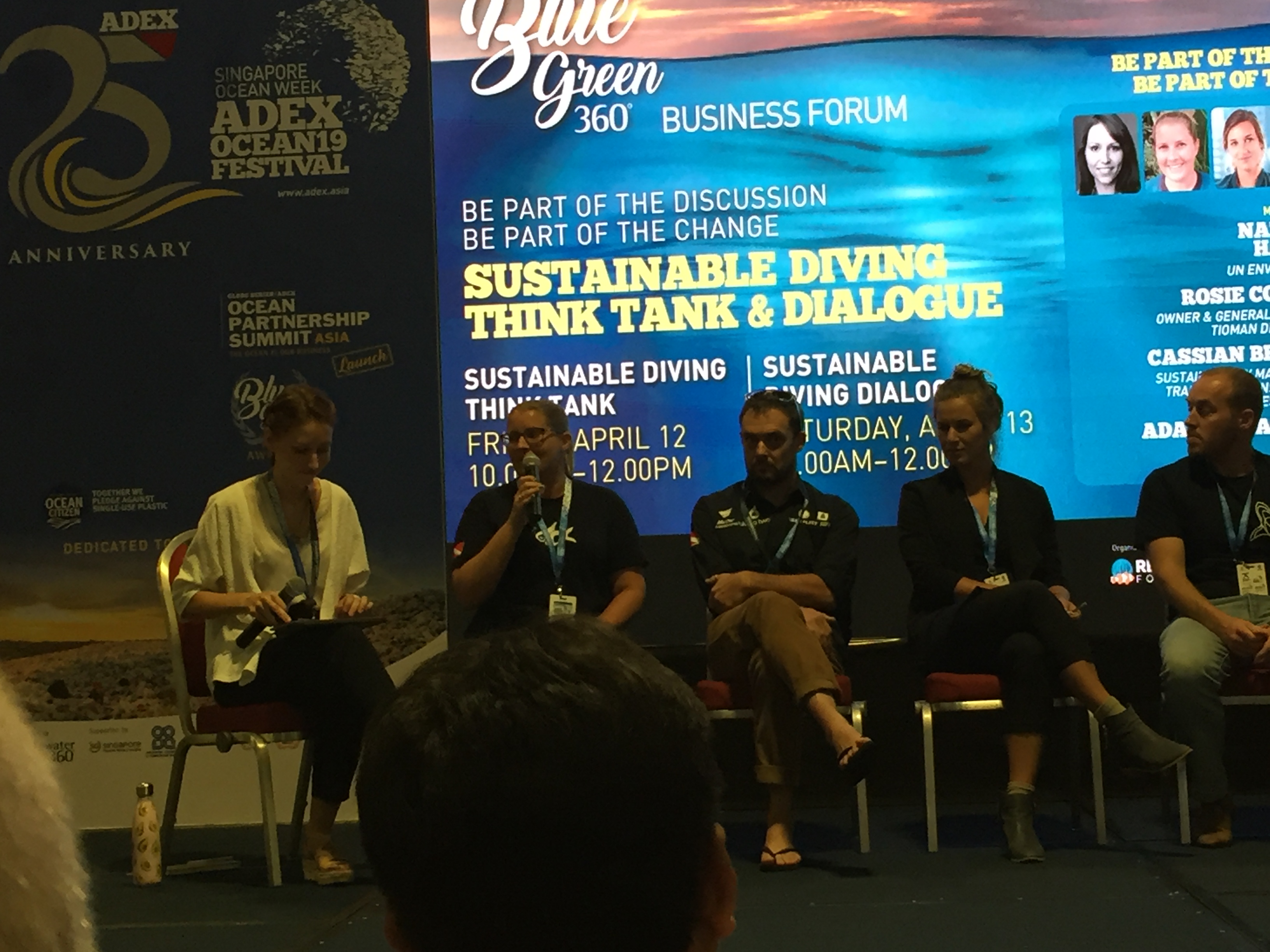
Case Study: Blue O Two/Worldwide Dive and Sail
Having been working on the greening of liveaboards for Blue O Two/Worldwide Dive and Sail as its Commercial Manager, Mik Jennings addressed the greatest threat to the environment – humans. With our footprint on the environment increasing proportionately with our numbers, marine protected areas (MPAs) are essential. Although a lot of governments have MPAs, the strict policing of these MPAs is key to the proper protection of the marine life in these areas.
Mik also shared that while one little company can do very little by itself, trying to get strength in numbers is also a challenge. One of the biggest roadblocks to being sustainable is obtaining the eco-friendly products. With a footprint of 15 resorts all over the world, Mik shared his difficult experience of obtaining sustainable products for all of Blue O Two’s resorts. As distributing products from a central source to all 15 resorts would lead to a bigger carbon footprint, the only option left to him was to source items in all 15 locations separately from local sources.
With audiences encouraged to join in the dialogue, Bruce Dudley, Senior Vice President of Globe Series, ADEX Singapore’s partner in the Ocean Partnership Summit in Singapore next year, posed a question to the panelists about whether any of the panelists had seen tangible rewards from being sustainable.
“We find it very mixed,” replied Mik to the question. He pointed out that while some chose holidays based on which holiday resort is sustainable, some people just don’t care. When Blue O Two put an announcement on its facebook about not throwing plastic bottles into the Red Sea, they received backlash about the move. But if they did not do this, they would lose money in the end.
Case Study: Zublu
In response to Bruce Dudley’s question, Adam Broadbent from Zublu replied that it was indeed hard to reward companies for being green as being sustainable is a process that is hard to scale up. Although it might just be a marketing benefit for now, Adam is of the opinion that “eventually it will become the status quo and you’ll get left behind if you don’t do the same”.
In response to Natalie about the demand and growth of sustainable dive tourism, Adam revealed that on the Zublu platform, they try to showcase sustainable liveaboards and dive resorts. Being “in the inspiring stage and discovery stage, Zublu plays an important role in showing consumers what is available”.
“People are making choices based on sustainability. Price still trumps for now but there are some very exciting places in trek in Borneo,” added Adam.
“Zublu is seeing demand from customers who want to get involved in conservation work while they are travelling.
“In terms of pre-travel – for us, sustainable travel starts from home. That’s where you have the biggest impact. By choosing a Green Fins member, you make sure you have a smaller carbon footprint,” Adam added.
Adam also shared what Zublu would like to do: which is to try to encourage more of their guests to be activists when they are at the destination and rewarding them for that so that they will book through Zublu again. Adam added that “rewarding people is the best way to engage people to do conservation work”.
Case study: Fourth Element
In response to the need for manufacturers and marine tourism business to be sustainable and green, Fourth Element founder, Jim Standing said, “Frankly we have to do it. If we don’t, the future is incredibly stark. We’ve accepted the higher cost and some of the kickback of making our product more expensive. If we don’t do this, the legs of the stool will fall off until you’re standing on the floor. We have to do this until consumers have no choice but to be green.”
In response to a question from Natalie about whether he felt sustainable dive tourism has an edge already, Jim answered affirmatively.
“There is a competitive advantage for sustainable businesses. We should be making something from our waste – ocean positive swimwear line, leggings from sustainable materials. Once you look into the rabbit hole, you can’t come back out.”
Jim added that committing to building sustainable products “fundamentally changed the DNA of Fourth Element to one where we make the product that is better for the ocean”. For Fourth Element, they’ve embarked on a journey where they will eliminate single use plastic by the year 2020. More of Fourth Element’s product line will be built with recycled material.
“We’re just a tiny company,” added Jim. “This is going to become important to everybody. We decided to make mission 2020 an aim. We want to make the whole industry committed to this. As a community, we can present our own pledges like a 70% reduction of plastic. Individual dive centers all over the world, we can all make changes . That can inform divers all around the world to follow and make changes – that will make a change that is positive for the ocean. I would encourage everybody to please join Mission 2020. There are phenomenal resorts out there who are doing great things. There are many conservation models that reward the poor villages to make enough money for their families.”
When asked about what support was needed, Jim laughingly added, “Just vote with your wallet and buy our stuff.” As a parting note, Jim reiterated his promise to share where his company sources their sustainable raw materials.
He revealed that his company working with other manufacturers who want to find out where Fourth Element sources their sustainable raw materials. He added that not only is there no sacrifice of performance for sustainability, the products they are making now, a lot of them perform better than non-sustainable versions.
Case Study: PADI (Asia Pacific)
Responding to a question from the public about the path forward when only one resort out of a handful in an area are sustainable, Paul Tanner from PADI was truthful.
“I don’t think there’s answer for it. It depends on what level the company is on the ladder to becoming sustainable. The dive centres here are the ones who are keen, the ones who are successful. Those dive centres who are not investing in this will die out. They’ll either destroy the community they’re in and they won’t have business or the other liveaboards who are green are going to take their business,” said Paul.
“The most successful ones, the ones who are charging more are the ones who are sustainable. It’s very difficult to do on a large scale, it always comes down to the community level. Guinea islands – they’re limited to two boats per expedition on one dive site. It all comes down to the local level.”
Paul further emphasised the importance of education, community and comunication to driving the movement. “From three to four years ago, we implemented a sea change in how we approach our teaching,” said Paul. “We are putting out materials and encouraging divers to drive sustainability and combat climate change. We are collecting as much data as we can. We are talking to manufacturers about BCDs that can tell us what kinds of environment we’re diving in. We’re using our reach – 5 million reach on social media – trying to push our message through our network. You’ll see a lot more change through this in two or three years.”
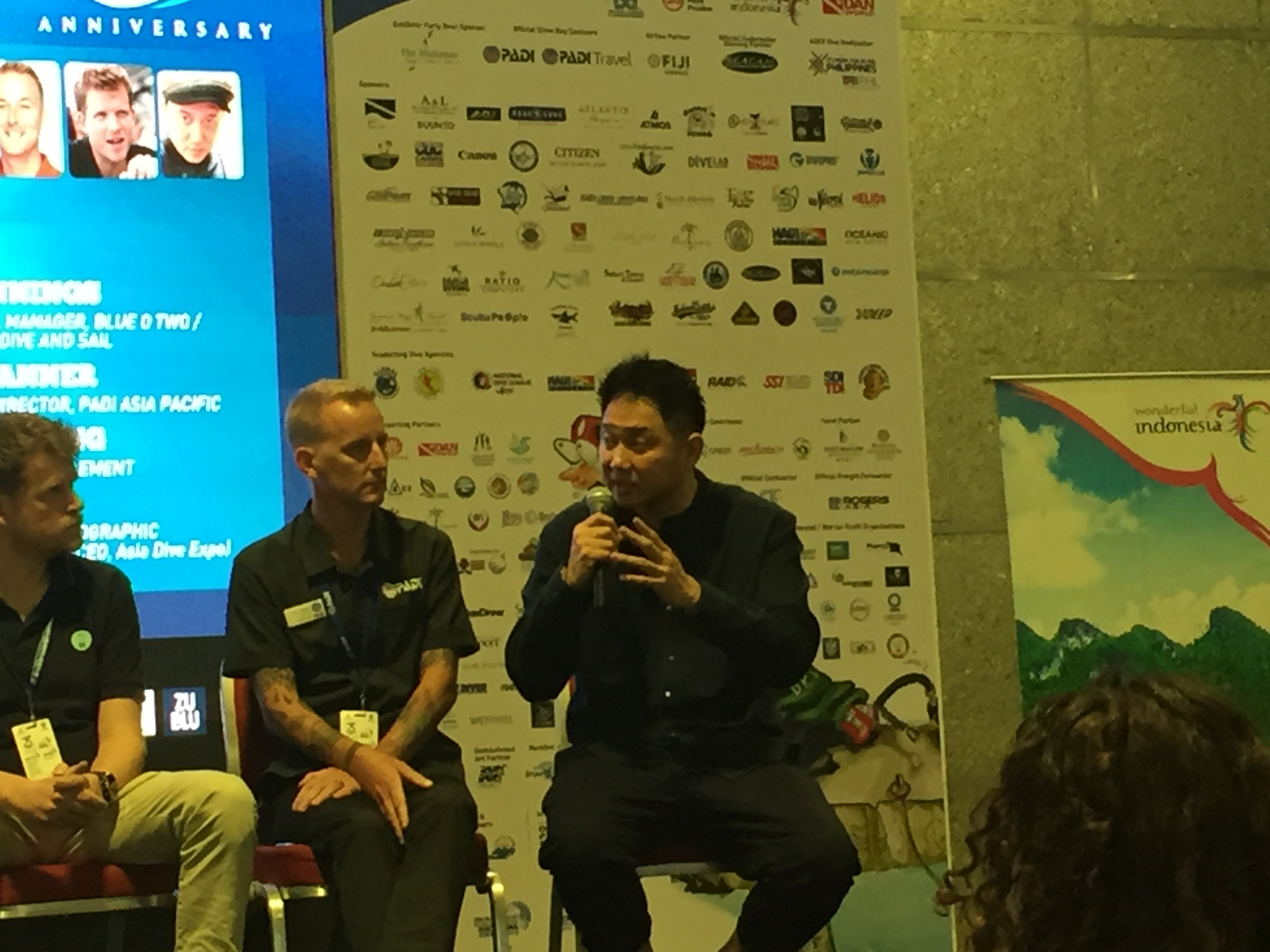
ADEX: The Road Ahead
Natalie also asked John Thet, CEO of ADEX Singapore about how he sees ADEX supporting issues on sustainability.
“I think we are not doing enough,” replied John. “That’s why next year we are repeating our theme. We used to change our theme every year but it’s not enough time to finish everything so we are repeating our theme next year. We want to give back to the ocean. There are many ways to do this. Plastic is a problem that’s hard to resolve. People only recycle 9% of their plastic. Making new plastic is cheaper than recycling an old one. Business wise it’s a tough choice to turn down.” “That’s why next year , we are talking about policy on a government to government basis, John added. “We need to talk to governments to ban plastic. We have to start with our own mission. We have to start with ourselves first. We have to stop using plastic so that the problem will be reduced. I don’t believe it’s only for us. It’s for the young generation. We should really promote the young generation to promote more voices from the young. That is what we need. We want to do more. Next year, we want to have combined announcements about companies announcing their bans and pledges for sustainability.”
“Yesterday, we saved the usage of thousands of plastic bottles by not using them. Like Paul said, if there’s more divers, there will be more ocean lovers. But we have to educate divers, or else more divers will lead to more damage to the environment. Content is very important for us to educate others.”
